#essay excerpt
Text
I was unfortunately so gripped by the excerpt in this post that I found the collection of essays it's from and read the entirety of this short essay! So here's some excerpts from it I like:
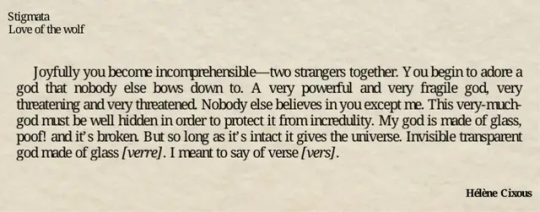
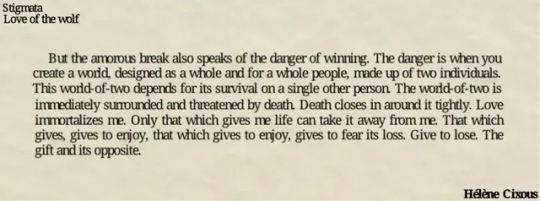
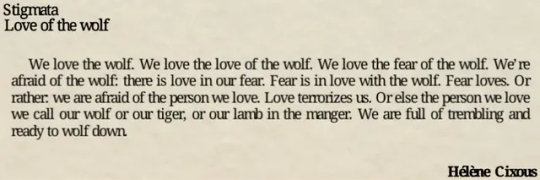

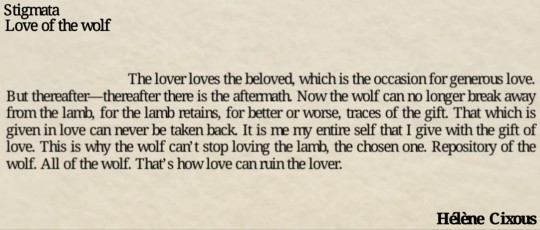
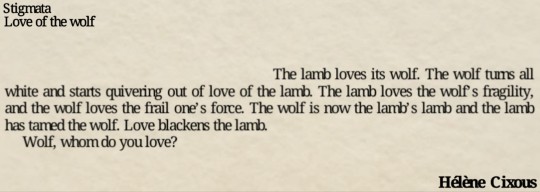
The essay is amazing and I plan on reading the collection in it's entirety. The collection is titled Stigmata: Escaping Text by Hélène Cixous.
#stigmata: escaping text#love of the wolf#Hélène Cixous#prose#spilled ink#essay excerpt#book excerpt#book aesthetic#love quotes#love#i almost want to tag this as lycanthropy as a metaphor#but its more#wolf and lamb symbolism#and#wolves and lambs as metaphor
1 note
·
View note
Text
It seemed more honest to remain silent.
Ingeborg Bachmann, quoted by R. Kolewe in 'Afterletters: From an essay on desire'
4K notes
·
View notes
Text
Dungeon Meshi episode 21, being heavily dialogue-driven, was pretty straightforward animation-wise and let Ryoko Kui's stunning art speak for itself for the most part, but that doesn't mean that there aren't still some GENERALLY-INSIGNIFICANT-DETAILS-TO-SCRUTINIZE-AT-ARGUABLY-UNNECESSARY-LENGTH.
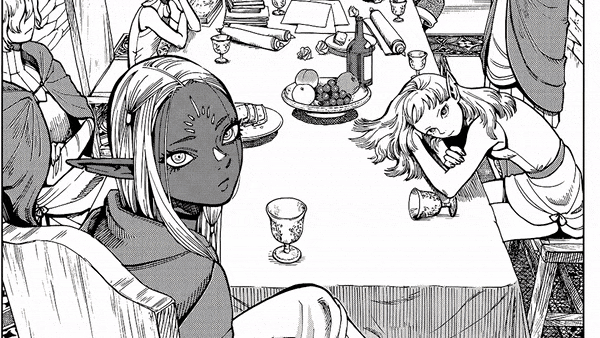
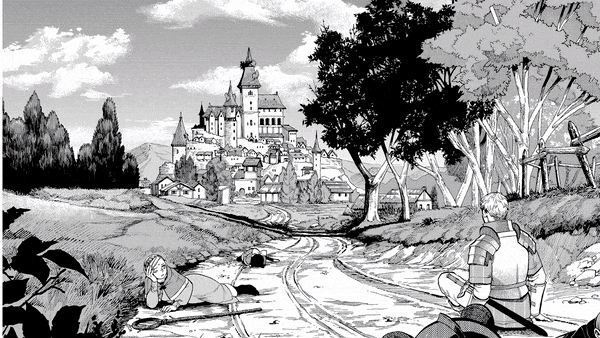
There was a strong emphasis on hands in this episode, particularly the second half, starting with this cut of Laios resting his on the Minotaur's snout.
The animators have taken this simple little panel (on the right) from the manga (btw, people who know more about this than I do, is there a name for this type of panel, which in film would be called an "insert shot"?)
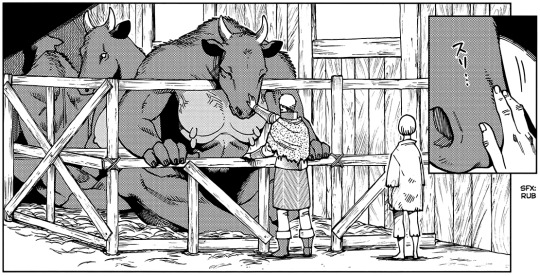
and turned it into this highly detailed tracking shot that heightens the emotional impact of this moment for Laios. It feels very similar to the shot of Kabru bringing a piece of fish to his mouth that introduced him to the series!
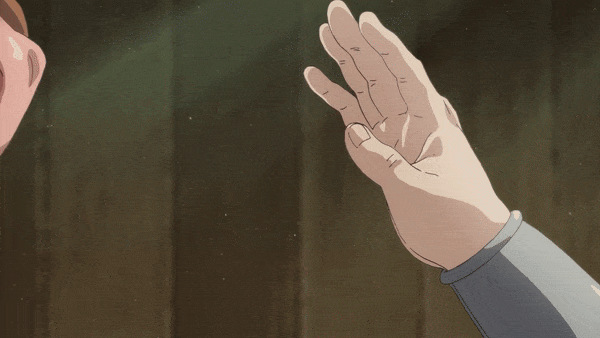

The theme comes up again when Laios does a little bit of blair-witching in the corner after being rejected by house-kitty-pilled Izutsumi,

and once again a few seconds later with this added close-up of Marcille's hand when she tries to read the magical aura of the area.
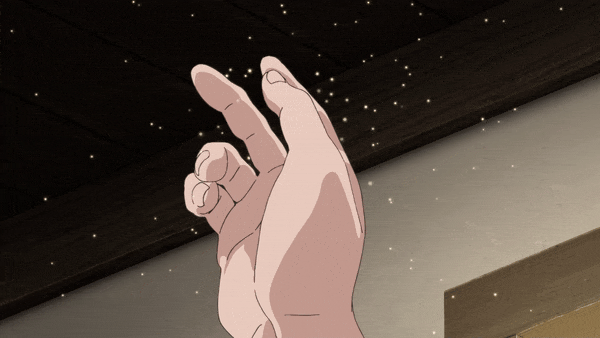
This one clearly makes heavy use of reference footage, to the point that it almost looks rotoscoped until you notice little details like this line that warps unrealistically at the heel of her palm.
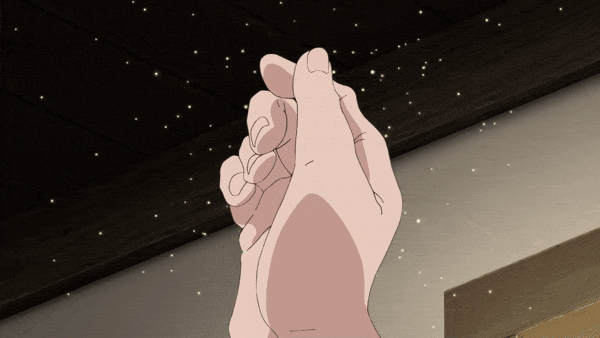
But with smooth, realistic motion like this, little details like that are much less important than the overall feeling of authentic shape and movement. This can be seen in a lot of Masaaki Yuasa's work, which often favors consistent motion and more frames over super polished individual drawings. Here's a thematically appropriate cut from Ping Pong for example:
(This one might actually be rotoscoped, I'm not sure)
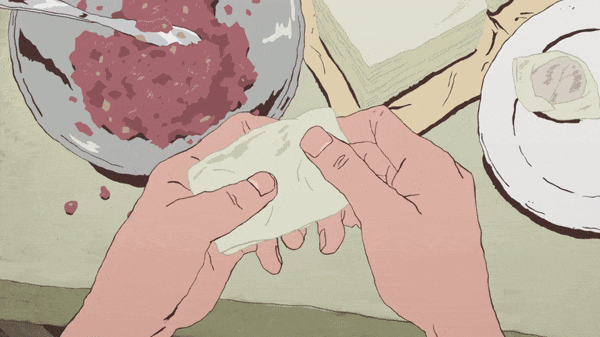
If you pause on any individual frame, the lines look wobbly and inconsistent, but it comes together as a whole to create something that feels authentic - real.
The heavy detail in the hand anatomy and the way the skin wrinkles around the knuckles in these cuts feels like a hard departure from Studio TRIGGER's signature heavy stylization, but these realistic cuts have popped up here and there since the start of this show, and I think they fit Dungeon Meshi really well! It can be jarring go straight from wacky bombastic cartoonsmanship to realism, but while it is a show about the hungriest hungriest himbo and his family of weirdos, it's also simultaneously a show about anatomy, ecology, and the horrors of the human mindbrain.
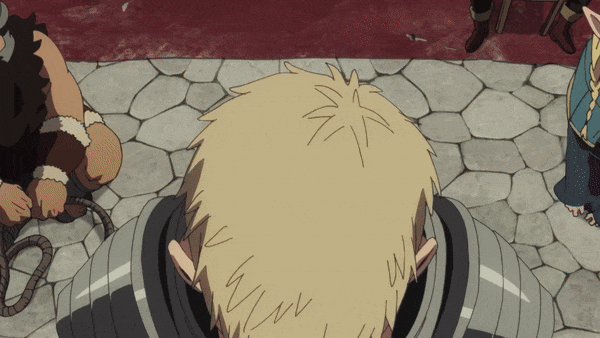
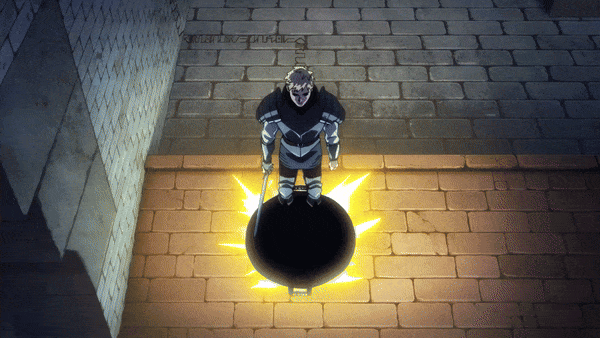
This was expanded from an excerpt from this video where I break down the whole episode, so if you want to continue wallowing in the sludge with me, consider checking out the video!
Thanks for reading.
youtube
#I feel like whenever I take an excerpt from my video scripts to turn into a post on here it ends up more fleshed out and over all better#because I have more time to think about it but also because I know some people on youtube will get mad if I talk about hands for 10 min XD#dungeon meshi#animation analysis#laios touden#marcille donato#mini essay#youtube#video#original#Youtube
586 notes
·
View notes
Text


Tomboy Survival Guide by Ivan Coyote
#tomboy survival guide#ivan coyote#literature#biography#trans#transmasc#lesbian#excerpts#essays#poetry#quotes#trans history#butch#butch identity#nonbinary#1k#mine
2K notes
·
View notes
Text
The motif of home is an essential concept to his character. Kaveh describes ‘home’ being different than to that of a ‘house’, as in a house indicates a solitary object, whereas ‘home’ refers to people
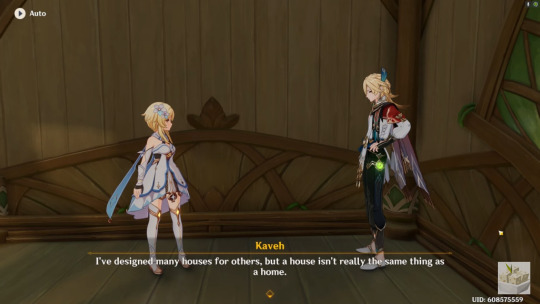
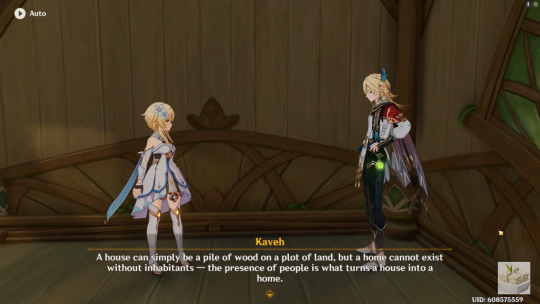
This is explained in the loss of Kaveh’s family resulted in his home becoming a house: “"Home" went from a sanctuary of warmth and light to a cold and lonely hall” (Kaveh Character Story 2).
The concept of a home, then, is particularly important in regard to Alhaitham as Alhaitham invited Kaveh to live in his house after Kaveh sold his family house to pay for the re-building of the Palace of Alcazarzaray. Kaveh, at this point in time, is described to be “homeless”, which is indicative of him not only being without a place to live, but without people which ‘home’ could come into fruition. After meeting Alhaitham for the first time in years after their parting, the concept of ‘home’ is directly related to Alhaitham:

Upon seeing his family’s house, his old “home”, which he had sold in order to provide the funding to rebuild the Palace of Alcazarzaray, Alhaitham prompts Kaveh to reflect on the pursuit of his ideals, whereafter Kaveh acknowledges that his ideals were not in the wrong, it is his method of achieving them. Kaveh resolves not to give up, and a second chance is presented to him in Alhaitham inviting Kaveh to live with him.
Where Kaveh ‘sees’ his old “home”, the family he no longer belongs to, all he lost due to his regrets, Alhaitham “sees” through Kaveh, understands him, and asks him a question which simultaneously renews his beliefs in his ideals and the future. This passage links Alhaitham’s sense of home to Kaveh, and offers Alhaitham as a home for Kaveh.
(Update: For more analyses like this, the essay this is taken from is now uploaded! It can be accessed here and here as as a pdf <3)
#alhaitham#kaveh#haikaveh#kavetham#haikaveh meta#this is an excerpt from the essay which i thought was nice#the idea of alhaitham listening intently to kaveh haunts me#also they are each others family and home!!!#this theme of family and home is so integral to kavehs character and alhaithams character stories#alhaithams character story says that kaveh is similarly lacking in familial attachments just like alhaitham#and when they met it was after alhaithams grandma passed and he enrolled in the akademiya#and when kavehs mother had left for fontaine#the two meet after losing these family attachments and then go onto form their own family#but the whole thing about sumeru academic family is a whole other post!!
274 notes
·
View notes
Text
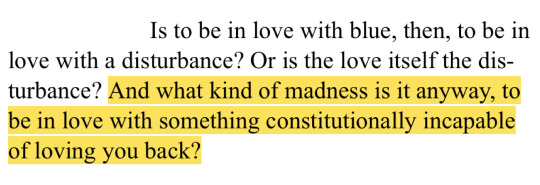
Maggie Nelson, from Bluets
[Text ID: “Is to be in love with blue, then, to be in love with disturbance? Or is the love itself the disturbance? And what kind of madness is it anyway, to be in love with something constitutionally incapable of loving you back?”]
#maggie nelson#love#madness#unrequited love#blue#disturbance#excerpts#writings#literature#prose poetry#lyric essay#fragments#selections#quotes#lit#words#typography#american literature
2K notes
·
View notes
Text
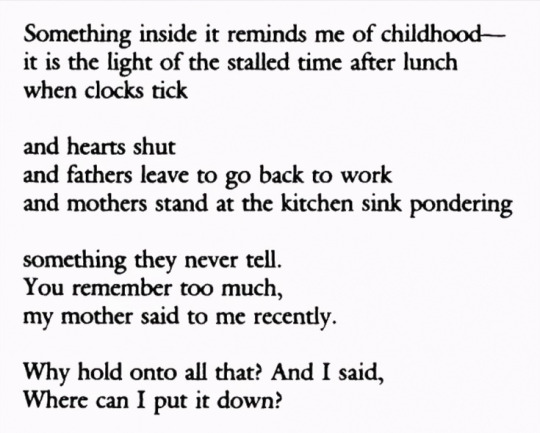
— Anne Carson, “The Glass Essay”, from Glass, Irony and God
#q#excerpts#anne carson#the glass essay#whacher#glass irony and god#lit#quotes#book quotes#poetry#words#literature#typography
57 notes
·
View notes
Text

i think about this all the time forever. this is about pen chikara katana by the way
113 notes
·
View notes
Text

Maggie Nelson, Bluets
#maggie nelson#bluets#writers and poets#writing#literature#poetry#excerpts#lit#literary quotes#essays#nonfiction#quotes#blue
43 notes
·
View notes
Text
This Wangxian Moment + Dynamic Discussion
If you guys have heard the watermelon extra from the audio drama, you'd know Wei Ying was such a polite boy since young! He never likes to demand, trouble others or ask for things. He is literally sunshine.
That's why I love this scene. Firstly, Lan Wangji finding a loophole around the rules to talk to Wei Wuxian.
Secondly:

Wei Wuxian, instead of asking for another meat pie, wishes to take what is present. If Lan Wangji doesn't want to eat, Wei Wuxian would gladly eat his seconds! Surviving on the streets eating watermelon peels of random people, he has no qualms about finishing someone's unfinished food. Instead of demanding for new things, he'd rather make do with what he has.
BUT.
The fact Lan Wangji sees him though despite their different upbringings. If Lan Wangji wanted something, it was only a matter of asking. Yet if Wei Wuxian wanted something, even if he asked, he won't get it. Asking is asking. Buying is buying. One doesn't correlate to the other. So, he would rather not show his true desire, just take what he gets - and this shows in his relationship with Lan Wangji, where he cherishes him drunk, pretends to faint so he can be carried, pretends to be injured so he can be picked, does meaningful actions like throwing flowers, touching his head ribbon, asking him to hold the rein, etc without explaining what it means for him! Thus, he can paint himself a happy fantasy and that's enough for him.
At least, that is what he thinks. Yet, as soon as Lan Wangji gets drunk, it is Wei Wuxian who loses his inhibitions, who starts desiring more and more, wanting more and even denying requests to play around.
And the fact that Lan Wangji himself is scared of directly asking because of the "debts" between them, he's scared Wei Wuxian will accept, not out of desire but out of gratefulness, which ties back to the trauma of his parents' situation :(
Regardless, I'm so happy for Wei Ying because now finally, one person can see through his words and facades and understand his desires and provide for them without him having to ask. Even if Wei Wuxian "denies," this person will give him what he wants forcibly - aka their non-con kink.
IT ALL TIES TOGETHER
#wei wuxian#lan wangji#mdzs#mo dao zu shi#novel excerpt#my thoughts#my meta#my essays#wangxian#wangxian dynamic#wangxian dynamic discussion#wanting and desiring are new for those who are used to being denied even the most basic of things
91 notes
·
View notes
Text
oh also, fun little tidbit about orin's songs: dentist has very prominent and consistent percussion (im convinced it was inspired by "oh yeah, maybe baby" by the crystals.) this sets him up as a character who is stable, powerful, methodical, and consistent in his actions. its also a musical contrast to audrey, whose music is very melody-focused
now (it's just the gas), on the other hand (specifically during orin's parts) is the complete opposite. the rhythm speeds up and slows rapidly, which not only makes it a horrifically difficult song to play and perform, it also symbolizes his slow fall toward death! as he gets weaker, that steady rhythm he once had fades and it becomes more erratic and inconsistent. its super clever and im surpised i havent found other mentions of this
#excerpts from my horribly long essay on orin#just some treats cuz i havent been as active#will be releasing a longer post later today probably? not the off broadway analysis its not ready yet#lsoh#little shop of horrors#orin lsoh#orin scrivello#lsoh orin
32 notes
·
View notes
Note
not 100% but I think the other anon is looking for an interview andrew garfield gave where he spoke about his grandmother's passing
ah no... that was actually him speaking about his mother's passing and it was this interview:


#still a very beautiful interview though. but the other one was written by a woman writer i'm fairly certain#ask#anon#update — the piece anon was looking for was from ramona ausubel's essay how to be a writer the map is the territory#posted the excerpt in the other ask!
195 notes
·
View notes
Text
the language of the unsaid.
Anne Carson, Glass, Irony, and God; from ‘The Glass Essay’
505 notes
·
View notes
Text
If you're not reading Boyfriend Material by Alexis Hall, you should be. I'm a 100 pages in and in absolute splits. Top-tier British queer comedy. 💀💀
(I'm also convinced the character the protag is trying to hook up with is autistic as hell.)
“No. God no. My mother’s French.”
“Ah. Lucien, then.” He said it perfectly, too, with the half-swallowed softness of the final syllable, smiling at me—the first full smile I’d seen from him, and shocking in its sweetness. “Vraiment? Vous parlez français?”
There’s really no excuse for what happened next. I think maybe I just wanted him to keep smiling at me. Because for some reason I said, “Oui oui. Un peu.”
And then, to my horror, he rattled off God knew what.
Leaving me to scrape the bottom of the barrel of my GCSE French, for which I’d received a D. “Um…um… Je voudrais aller au cinema avec mes amis? Ou est la salle de bain?”
Utterly perplexed, he pointed. So I was obliged to go the bathroom.
When I slunk back, he immediately confronted me with “You don’t speak French at all, do you?”
“No.” I hung my head. “I mean, my mother used both when I was growing up, but I still turned out stubbornly monolingual.”
“Then why didn’t you just say that?”
“I…don’t know. I guess I assumed you didn’t speak French either?”
“Why on earth would I imply I could speak French, when I couldn’t?”
I stuffed a teetering forkful of pie into my mouth. “You’re right. That would be a deranged thing to do.”
#increasingly feral capslocking screaming meta-essaying liveblog in the notes#with random excerpts of the funniest shit but i really did try not to spoil the important stuff#tbh i don't think anything really can forewarn you of this reading experience#i think it qualifies as 'real literature' whatever that's supposed to be‚ because of how much it interrogates and subverts#lgtbtqia#mlm romance#queer lit#british comedy#book recommendations#book reccs#boyfriend material#alexis hall#nonbinary author#knee of huss
190 notes
·
View notes
Text
“Most therians can easily relate to or understand mammalian shifts, being wolves, or cats, or foxes… even I can relate to it, having had wolf cameo shifts every so often… but very few know what it’s like to be a reptile, especially a snake. Long before I knew what a therian was, I believed strongly that I was a serpent. [...] I learned to work out these shifts and urges through my art work, and later, through learning to belly dance. [...] When I belly dance, it is a profound experience, because I work out that slithering motion, I work out a shift, where I feel beautiful and liberated, I become at once the snake and the snake charmer. [...] Most may see a pretty girl who dances really well, but to me, I am showing them what I feel inside through a beautiful, ancient, and ever-feminine art.”
- Excerpt from SerpentineZebra’s essay “Snake Eyes: Living as a Cobra Therian.” February 27, 2009. Read the full essay here.
#therianthrope#therian#therianthropy#reptile#snake#dance#quote#excerpt#article#essay#SerpentineZebra#cobra#gender#shapeshifting#nonhumanity and gender#alterhumanity and gender
200 notes
·
View notes
Text
The parallels between Kaveh and his mother and what this implies for Kaveh and Alhaitham
(This is an excerpt taken from my Haikaveh essay! If you're interested you can check it out here or as a pdf <3)
When discussing Kaveh’s mother, Faranak, with her old teacher Zaha Hadi in order to discover the password that will unlock Faranak’s journal, “companionship” is given as the password over “understanding”. This is due to Faranak placing more value in the companionship of Kaveh’s father over him understanding her artistry, as despite his lack of understanding, he stayed at her side regardless in order to “support” her. Zaha Hadi states that Kaveh’s father’s support was likely the reason that Faranak chose him over her “many admirers”, which Kaveh then equates to “companionship”:




A romantic connotation is created by the association of “companionship” with the relationship between Kaveh’s mother and father. Although companionship is also assigned to a platonic connection, pictured in Faranak’s journal of the gathering consisting of Tighnari’s parents, Alhaitham’s parents, and Cyno’s adoptive father. Her advice to Kaveh of pursuing companionship, too, falls in the platonic category, as she states for him to: “seek a friend” in order to gain support. Companionship, then, becomes dually used for romantic and platonic connections.

It is interesting then, that Faranak herself can be used as an allusion to Kaveh. This is emanated in how the two share many similarities, not only in physical attributes, their studying in Kshahrewar, and their shared profession as an architect, but also in their mannerisms and their method of working.


Just as Faranak keeps a diary, Kaveh writes in an ‘Old Sketchbook’. Faranak is described as a “perfectionist” who insisted on redesigning drafts, just as Kaveh designs six drafts for a singular client.


She is also described to have a “sensitive and vulnerable heart”, just as Kaveh is described to be “sensitive” due to his empathetic nature.

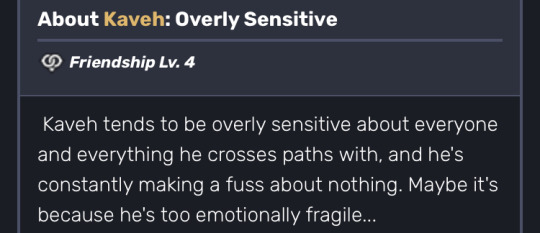
Just like Kaveh, she is said to have gotten into a “heated argument” with a friend, presumably over conflicting viewpoints on art. As an artist, her woes are that of Kaveh’s, stemming from being misunderstood by others.



As she is directly compared with Kaveh and as their similarities are listed, it can be inferred that the two are to be paralleled due to their resemblance. It is relevant then to look to her view of her relationship with Kaveh’s father as it provides a perspective of an ideal companion for a struggling artist:


This is interesting in regard to the relationship presented here to that which exists between Kaveh and Alhaitham.
Kaveh and Alhaitham have a mutually deep understanding of each other, which creates a sense of intimacy that they share with no other character. Additionally, Kaveh has the similar struggle of being eclipsed by a “dream” in his heart, as in, his ideals conflicting with his own self-interest. Kaveh’s father, rather than understanding Kaveh's mother's ideals in relation to himself, seeks to support her, “listen[ing] to her joys and share[ing] in her sorrows”. This is a similar statement to Alhaitham’s “listen[ing] intently” to Kaveh’s troubles when meeting in a tavern, calling to question Kaveh’s pursuit of his ideals: “How has realising your ideals gone for you?”

Where Faranak writes of meeting her future husband for the first time, Kaveh’s meeting Alhaitham is recorded in a similar instance:
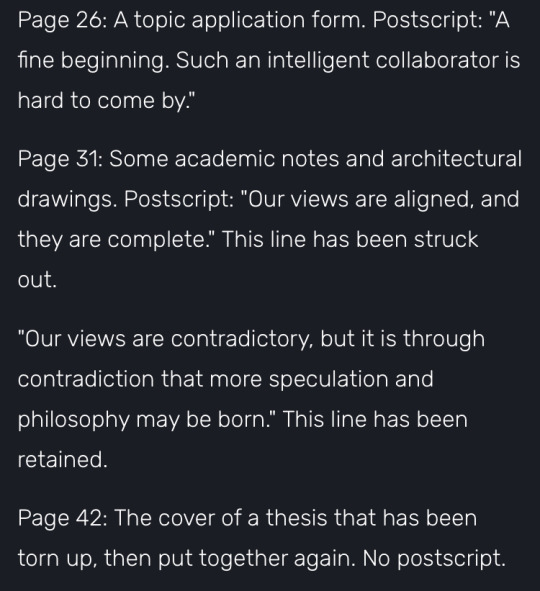
When comparing Faranak’s first impression of her future husband with that of Kaveh’s impression upon first meeting Alhaitham, the two are dissimilar. Kaveh notes that it is rare to meet someone of his intellect, and therefore appears to treasure the bond, whereas Faranak is seemingly indifferent to Kaveh’s father, but he appears to grow on her. In regard to Kaveh and Alhaitham’s relationship history as a whole, however, similarities can be noted.
Where Kaveh and Alhaitham fell out due to differing viewpoints and their inability to effectively communicate, Kaveh can be seen to not “think much” of Alhaitham’s perspective. When the two meet again in the future, this perception of Kaveh’s has the potential to become applicable only to a “younger [Kaveh]”, as Alhaitham is the only person whom he has formed an “intimate bond” with. Although Alhaitham will not be able to understand him in terms of empathy, Alhaitham can provide companionship, just as Kaveh’s father did for Faranak, which in turn, caused their relationship to develop into that of an “intimate bond”.
A parallel can be drawn between the bond Kaveh’s mother and father had, and the bond between Kaveh and Alhaitham. As although Alhaitham cannot understand Kaveh’s artistic struggles and his personal struggles of empathy, he supports Kaveh in trying to alleviate Kaveh’s suffering and his willingness to listen.
As Kaveh’s mother specifically highlights that it is not understanding which will help Kaveh, it is companionship, which draws strong links to the identified message in A Parade of Providence. As Alhaitham states that he knows that Kaveh will never understand Alhaitham’s way of thinking in regard to his own ideals, but that their relationship is not based upon who is right or wrong. A more in-depth analysis regarding this can be found here.
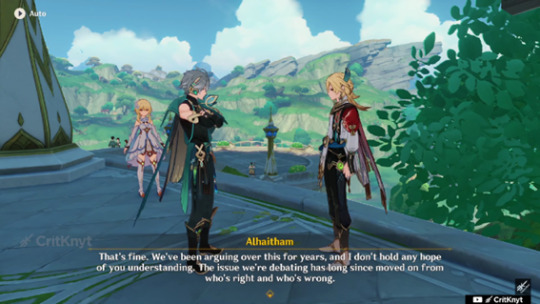
Alhaitham and Kaveh cannot understand each other in the sense that they can properly empathise and relate with each other’s way of thinking, but they can support one another in the progression of self, and ultimately be a constant source of support for the other. This is demonstrated in the elaboration of the bond between Kaveh’s mother and father, and the parallels drawn between Kaveh and his mother. Companionship is a solution for Kaveh’s mother just as it is for Kaveh.
This can be seen in Faranak’s drawing of a gathering and the picture obtained at Kaveh’s Hangout ending, ‘Leisurely Gathering’. The player is prompted to draw parallels between the people in the picture and the characters the player has met:
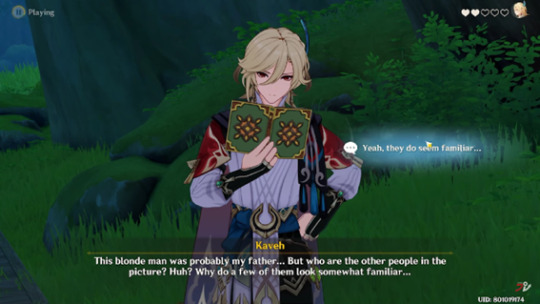
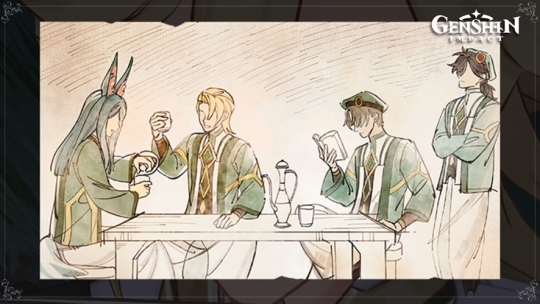

The photo shown parallels the ‘Leisurely Gathering’ ending route picture, as Kaveh is positioned where his father sat, and Tighnari, Alhaitham, and Cyno placed in accordance to where their fathers are placed. Rather than being turned away from Alhaitham, like Kaveh’s father is to Alhaitham’s father in the drawing, Kaveh and Alhaitham are centre frame, and their focus is on each other. Companionship then, whilst being this particular group of friends, particularly refers to that of the bond between Kaveh and Alhaitham. The dual meaning assigned to “companionship” means that both a romantic and platonic interpretation has been generated to apply here - another example of methods used to queercode Kaveh and Alhaitham's relationship.
#haikaveh#kavetham#alhaitham#kaveh#haikaveh meta#genshin meta#it is time to post some of my fav excerpts from the essay#this one had me going crazy in particular because it's there in the surface text#kaveh and his mother are 'similar'#then zaha hadi goes on to explain kaveh's akademiya days#kaveh's hangout and a parade of providence are intrinsically linked#and the idea of companionship being an antidote comes up again after the interdarshan championship#when kaveh takes his friends out for a meal#BUT ALHAITHAM ISNT THERE#and kaveh talks about alhaitham's note that he cant figure out and how he wants to talk to alhaitham...#im so so sick but you know this
112 notes
·
View notes